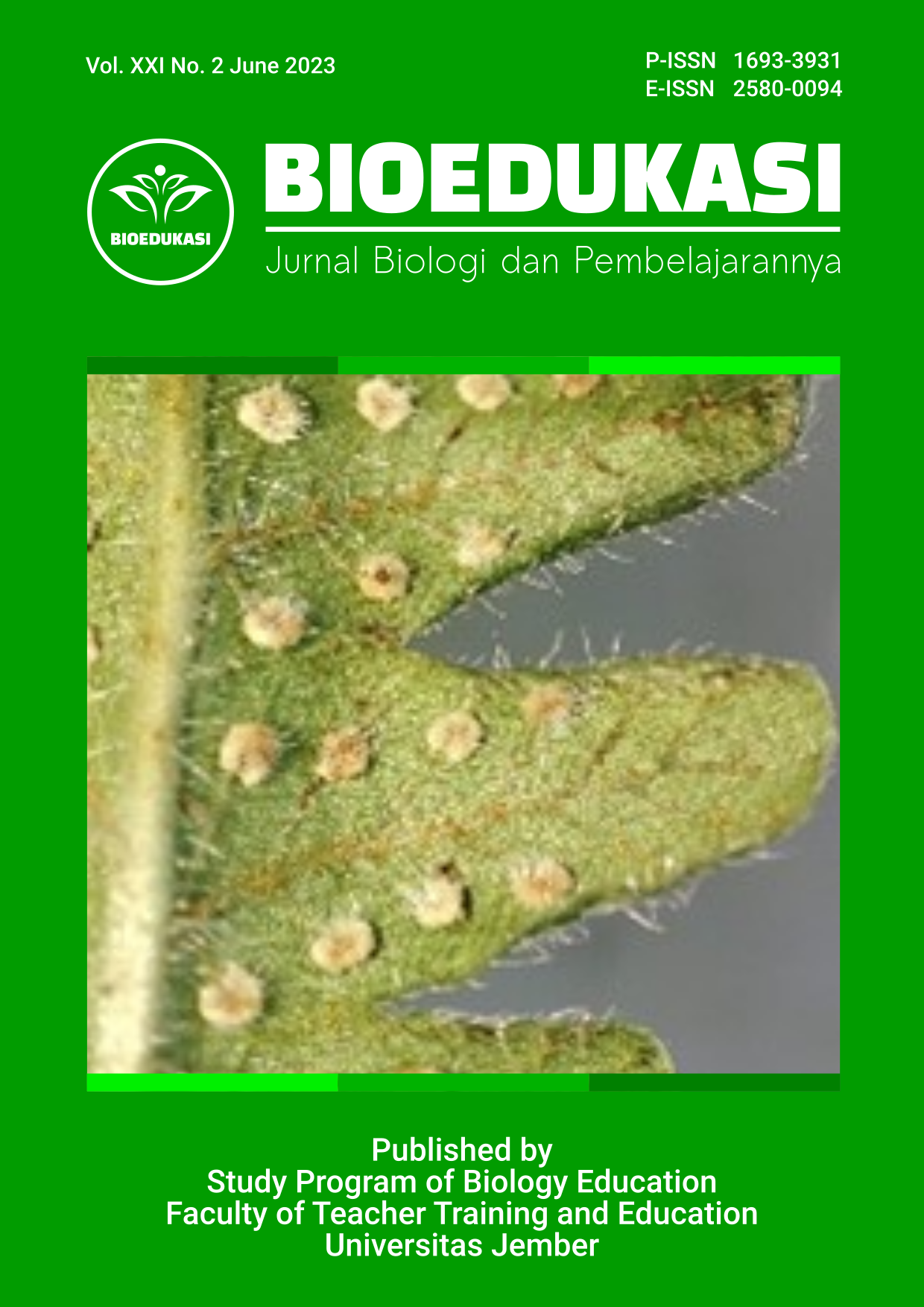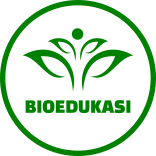Developing of Electronic Module on Problem-based Learning (PBL) to Improve Creative Thinking Skills
DOI:
https://doi.org/10.19184/bioedu.v21i2.39620Keywords:
Creative thinking skills, Electronic module, Problem-based learningAbstract
Creative thinking skills can be empowered to students during the learning process using appropriate learning materials. The study aimed to develop electronic module on problem-based learning that is valid, practical and effective to improve students' creative thinking skills. This development follows the model of Lee & Owens (Assessment/ analysis; Design; Development; Implementation; and Evaluation). The validity was determined based on expert assessment (media, material, educational practitioners) and practicality was evaluated based on field practitioners and students' responses which were analyzed descriptive quantitative percentages. Meanwhile, the effectiveness data were collected through open questions to assess the improve in creative thinking skills based on the rubric of creative thinking skills and analyzed using the N-gain score. The results showed that the developed electronic module on problem-based learning was declared as very valid (98.6%), very practical based on practitioners' responses (93.55%) students' responses (95.92%), and effective for improving creative thinking skills (0,35). Hence, it can be concluded that electronic module on problem-based learning can be used to improve students' creative thinking skills.
Downloads
References
Amrulloh, R., Suratno, S., & Wahyuni, D. (2020). Development of high school biological module based on pictorial riddle inquiry in human motion system. International Journal of Advanced Engineering Research and Science, 7(12), 177–180. https://doi.org/10.22161/ijaers.712.27
Andini, S. A., & Hobri, S. (2017). Students’ activity in problem-based learning (PBL) math classroom be oriented lesson study for learning community (Lslc). International Journal of Advanced Research, 5(9), 1395–1400. https://doi.org/10.21474/ijar01/5458
Arends, R. I. (2012). Learning to teach (9th ed.). McGrow-Hill Companies.
Asrizal, A., Yurnetti, Y., & Usman, E. A. (2022). Ict rhematic science teaching material with 5E learning cycle model to develop students’ 21st-century skills. Jurnal Pendidikan IPA Indonesia, 11(1), 61–72. https://doi.org/10.15294/jpii.v11i1.33764
BSAKP. (2022). Keputusan Kepala Badan Standar, Kurikulum dan Asesmen Pendidikan Kementerian Pendidikan, Kebudayaan, Riset dan Teknologi Nomor 003/H/KR/2022 tentang Perubahan atas Keputusan Kepala Badan Standar, Kurikulum dan Asesmen Pendidikan Kementerian Pendidikan, Ke (pp. 1–1822). https://litbang.kemdikbud.go.id
Gunawan, G., Sahidu, H., Harjono, A., & Suranti, N. M. Y. (2017). The effect of project based learning with virtual media assistance on student’s creativity in physics. Cakrawala Pendidikan, XXXVI(2), 167–179.
Handayani, A., & Koeswanti, H. D. (2021). Meta-analisis model pembelajaran problem based learning (PBL) untuk menigkatkan kemampuan berpikir kreatif. Jurnal BASICEDU, 5(3), 1349–1355.
Hanif, S., Fany, A., Wijaya, C., & Winarno, N. (2019). Enhancing students’ creativity through STEM project-based learning. Journal of Science Learning, 2(2), 50–57. https://doi.org/10.17509/jsl.v2i2.13271
Ikalindhari, A., Ambarwati, R., & Rahayu, D. A. (2020). Developing student worksheet based on iMindMap in animalia topic to train creative thinking ability. JPBI (Jurnal Pendidikan Biologi Indonesia), 6(3), 423–435. https://doi.org/10.22219/jpbi.v6i3.13235
Karenina, A., Widoretno, S., & Prayitno, B. A. (2020). Effectiveness of problem solving-based module to improve analytical thinking. In International Conference on Science Education and Technology (Vol. 1511, Issue 1). IOP Publishing. https://doi.org/10.1088/1742-6596/1511/1/012093
Khoiriyah, A. J., & Husamah, H. (2018). Problem-based learning: Creative thinking skills, problem-solving skills, and learning outcome of seventh grade students. JPBI (Jurnal Pendidikan Biologi Indonesia), 4(2), 151–160. https://doi.org/10.22219/jpbi.v4i2.5804
Kurniawan, I. K., Parmiti, D. P., & Kusmariyatni, N. (2020). Pembelajaran IPA dengan model problem based learning berbantuan media sudio visual meningkatkan pemahaman konsep siswa. Jurnal EDUTECH Universitas Pendidikan Ganesha, 8(2), 80–92.
Muliyati, D., Bakri, F., & Ambarwulan, D. (2018). Aplikasi android modul digital fisika berbasis discovery learning. WaPFi (Wahana Pendidikan Fisika), 3(1), 74. https://doi.org/10.17509/wapfi.v3i1.10944
Patmawati, K., Puspitasari, N., Mutmainah, S. N., & Prayitno, B. E. (2019). Profil kemampuan berfikir kreatif ditinjau dari kemampuan akademik mahasiswa. Edu Sains Jurnal Pendidikan Sains & Matematika, 7(2), 11–18. https://doi.org/10.23971/eds.v7i2.1386
Pramana, M. W. A., Jampel, I. N., & Pudjawan, K. (2020). Meningkatkan hasil belajar biologi melalui e-modul berbasis problem based learning. Jurnal Edutech Undiksha, 8(2), 17. https://doi.org/10.23887/jeu.v8i2.28921
Rahardjanto, A., Husamah, H., & Fauzi, A. (2019). Hybrid-PjBL : Learning outcomes , creative thinking skills , and learning motivation of preservice teacher. International Journal of Instruction, 12(2), 179–192.
Reche, I., & Perfectti, F. (2020). Promoting individual and collective creativity in science students. Trends in Ecology and Evolution, 35(9), 745–748. https://doi.org/10.1016/j.tree.2020.06.002
Rochmawati, A., Wiyanto, W., & Ridlo, S. (2020). Analysis of 21 st century skills of student on implementation project based learning and problem posing models in science learning. Journal of Primary Education, 9(1), 58–67.
Sandika, B., & Fitrihidajati, H. (2018). Improving creative thinking skills and scientific attitude through inquiry-based learning in basic biology lecture toward student of biology education. JPBI (Jurnal Pendidikan Biologi Indonesia), 4(1), 23–28. https://doi.org/10.22219/jpbi.v4i1.5326
Supena, I., Darmuki, A., & Hariyadi, A. (2021). The influence of 4C (Constructive, Critical, Creativity, Collaborative) learning model on students ’ Learning outcomes. International Journal of Instruction, 14(3), 873–892.
Treffinger, D. J., Young, G. C., Selby, E. C., & Shepardson, C. (2002). Assessing Creativity: A Guide for Educators. In Journal of Education and Learning (Issue December). The National Research Centre on The Gifted and Talented. http://www.eric.ed.gov/ERICWebPortal/detail?accno=ED505548%0Ahttp://dx.doi.org/10.1007/s41465-016-0002-3
Wilis, R., Prayitno, A. B., Sunarno, W., & Anjirawaroj, S. (2023). Improving students ’ metacognitive abilities and creative thinking skills through STEM-based in online learning. JPBI (Jurnal Pendidikan Biologi Indonesia), 9(1), 90–102.
Yustina, Y., Syafii, W., & Vebrianto, R. (2020). The effects of blended learning and project-based learning on pre-service biology teachers’ creative thinking through online learning in the covid-19 pandemic. Jurnal Pendidikan IPA Indonesia, 9(3), 408–420. https://doi.org/10.15294/jpii.v9i3.24706






